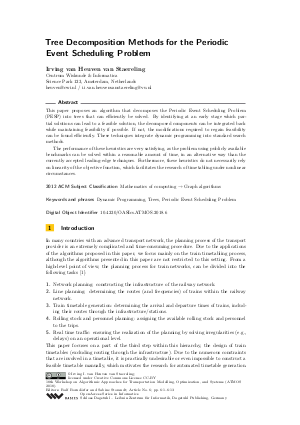Tree Decomposition Methods for the Periodic Event Scheduling Problem
Author Irving van Heuven van Staereling
-
Part of:
Volume:
18th Workshop on Algorithmic Approaches for Transportation Modelling, Optimization, and Systems (ATMOS 2018)
Part of: Series: Open Access Series in Informatics (OASIcs)
Part of: Conference: Symposium on Algorithmic Approaches for Transportation Modelling, Optimization, and Systems (ATMOS) - License:
 Creative Commons Attribution 3.0 Unported license
Creative Commons Attribution 3.0 Unported license
- Publication Date: 2018-08-28
File

PDF
OASIcs.ATMOS.2018.6.pdf
- Filesize: 491 kB
- 13 pages
Document Identifiers
Subject Classification
ACM Subject Classification
- Mathematics of computing → Graph algorithms
Keywords
- Dynamic Programming
- Trees
- Periodic Event Scheduling Problem
Metrics
- Access Statistics
-
Total Accesses (updated on a weekly basis)
0PDF Downloads0Metadata Views
Abstract
This paper proposes an algorithm that decomposes the Periodic Event Scheduling Problem (PESP) into trees that can efficiently be solved. By identifying at an early stage which partial solutions can lead to a feasible solution, the decomposed components can be integrated back while maintaining feasibility if possible. If not, the modifications required to regain feasibility can be found efficiently. These techniques integrate dynamic programming into standard search methods. The performance of these heuristics are very satisfying, as the problem using publicly available benchmarks can be solved within a reasonable amount of time, in an alternative way than the currently accepted leading-edge techniques. Furthermore, these heuristics do not necessarily rely on linearity of the objective function, which facilitates the research of timetabling under nonlinear circumstances.
Cite As Get BibTex
Irving van Heuven van Staereling. Tree Decomposition Methods for the Periodic Event Scheduling Problem. In 18th Workshop on Algorithmic Approaches for Transportation Modelling, Optimization, and Systems (ATMOS 2018). Open Access Series in Informatics (OASIcs), Volume 65, pp. 6:1-6:13, Schloss Dagstuhl – Leibniz-Zentrum für Informatik (2018)
https://doi.org/10.4230/OASIcs.ATMOS.2018.6
BibTex
@InProceedings{vanheuvenvanstaereling:OASIcs.ATMOS.2018.6,
author = {van Heuven van Staereling, Irving},
title = {{Tree Decomposition Methods for the Periodic Event Scheduling Problem}},
booktitle = {18th Workshop on Algorithmic Approaches for Transportation Modelling, Optimization, and Systems (ATMOS 2018)},
pages = {6:1--6:13},
series = {Open Access Series in Informatics (OASIcs)},
ISBN = {978-3-95977-096-5},
ISSN = {2190-6807},
year = {2018},
volume = {65},
editor = {Bornd\"{o}rfer, Ralf and Storandt, Sabine},
publisher = {Schloss Dagstuhl -- Leibniz-Zentrum f{\"u}r Informatik},
address = {Dagstuhl, Germany},
URL = {https://drops.dagstuhl.de/entities/document/10.4230/OASIcs.ATMOS.2018.6},
URN = {urn:nbn:de:0030-drops-97112},
doi = {10.4230/OASIcs.ATMOS.2018.6},
annote = {Keywords: Dynamic Programming, Trees, Periodic Event Scheduling Problem}
}
Author Details
References
-
M. R. Bussieck, T. Winter, and U.Y. Zimmerman. Discrete optimization in public rail transport. Mathematical Programming B 79, pages 415-444, 1997.

-
M. Goerigk and A. Schobel. Improving the modulo simplex algorithm for large-scale periodic timetabling. Computers &Operations Research 40, page 1363–1370, 2013.

-
L. G. Kroon, D. Huisman, and G. Maróti. Railway timetabling from an operations research perspective. Econometric Institute Report EI2007-22, 2007.

-
C. Liebchen. A cut-based heuristic to produce almost feasible periodic railway timetables. Lecture Notes in Computer Science, 2005:354-366, 2005.

-
C. Liebchen and R. H. Mohring. The modeling power of the periodic event scheduling problem: Railway timetabes - and beyond. Algorithmic Methods for Railway Optimization, pages 3-40, 2007.

-
C. Liebchen and L. Peeters. Some practical aspects of periodic timetabling. In Operations Research Proceedings 2001, pages 25-32, 2001.

-
T. Lindner. Train Schedule Optimization in Public Rail Transport. PhD thesis, Braunschweig University of Technology, 2000.

-
K. Nachtigall. Cutting planes for a polyhedron associated with a periodic network. Technical report, DLR Interner Bericht, 1996.

- Karl Nachtigall and Jens Opitz. Solving Periodic Timetable Optimisation Problems by Modulo Simplex Calculations. In Matteo Fischetti and Peter Widmayer, editors, 8th Workshop on Algorithmic Approaches for Transportation Modeling, Optimization, and Systems (ATMOS'08), volume 9 of OpenAccess Series in Informatics (OASIcs), Dagstuhl, Germany, 2008. Schloss Dagstuhl-Leibniz-Zentrum fuer Informatik. URL: http://dx.doi.org/10.4230/OASIcs.ATMOS.2008.1588.
-
M. A. Odijk. Construction of periodic timetables, part i: A cutting plane algorithm. Technical report, Delft University of Technology, 1994.

-
M. A. Odijk. Construction of periodic timetables, part ii: An application. Technical report, Delft University of Technology, 1994.

-
M. A. Odijk. A constraint generation algorithm for the construction of periodic railway timetables. In Transportation Research Part B: Methodological, volume 30, pages 455-464, 1996.

-
L. W. Peeters. Cyclic Railway Timetable Optimization. PhD thesis, Erasmus University Rotterdam, 2003.

-
G. J. Polinder. Resolving infeasibilities in the PESP model of the Dutch railway timetabling problem. PhD thesis, Erasmus University Rotterdam, 2015.

-
A. Schrijver and A. Steenbeek. Spoorwegdienstregelingontwikkeling. Technical report, Centrum voor Wiskunde en Informatica, 1993.

-
P. Serafini and W. Ukovich. A mathematical model for periodic event scheduling problem. SIAM Journal of Discrete Mathematics, 2:550-581, 1989.

